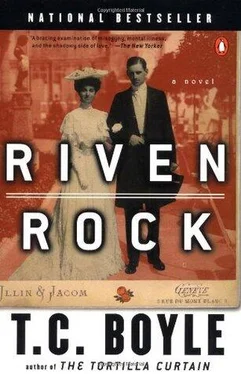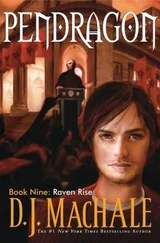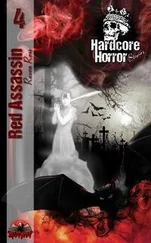T. Boyle - Riven Rock
Здесь есть возможность читать онлайн «T. Boyle - Riven Rock» весь текст электронной книги совершенно бесплатно (целиком полную версию без сокращений). В некоторых случаях можно слушать аудио, скачать через торрент в формате fb2 и присутствует краткое содержание. Год выпуска: 1999, Издательство: Penguin Books, Жанр: Современная проза, на английском языке. Описание произведения, (предисловие) а так же отзывы посетителей доступны на портале библиотеки ЛибКат.
- Название:Riven Rock
- Автор:
- Издательство:Penguin Books
- Жанр:
- Год:1999
- ISBN:нет данных
- Рейтинг книги:5 / 5. Голосов: 1
-
Избранное:Добавить в избранное
- Отзывы:
-
Ваша оценка:
- 100
- 1
- 2
- 3
- 4
- 5
Riven Rock: краткое содержание, описание и аннотация
Предлагаем к чтению аннотацию, описание, краткое содержание или предисловие (зависит от того, что написал сам автор книги «Riven Rock»). Если вы не нашли необходимую информацию о книге — напишите в комментариях, мы постараемся отыскать её.
Riven Rock — читать онлайн бесплатно полную книгу (весь текст) целиком
Ниже представлен текст книги, разбитый по страницам. Система сохранения места последней прочитанной страницы, позволяет с удобством читать онлайн бесплатно книгу «Riven Rock», без необходимости каждый раз заново искать на чём Вы остановились. Поставьте закладку, и сможете в любой момент перейти на страницу, на которой закончили чтение.
Интервал:
Закладка:
At Danvers he got down, shaking so hard he was afraid his legs wouldn’t hold him upright, and already there was a crowd gathering, farmers in overalls and their red-faced wives, children on whirling legs, the man who sold insurance and the bank clerk just released to his lunch hour. Stanley tried to manage a smile, and he knew he must have been a sight, six foot four and looking like a man from Mars in his goggles and leather cap and the sweat-drenched greatcoat all furred with dust, feathers and moribund insects, but his facial muscles didn’t seem to want to cooperate. He lifted a feeble hand in greeting or warning or capitulation, he didn’t know what or which, and staggered into the restaurant next to the barber shop with the sign in the window that said HAIRCUT & SHAVE Two BITS.
Inside it was cool and dark, walls paneled in pine, a scent of sweet pine sap at war with the cooking smells, boiled wienerwurst, fried onions, beef gravy, lard vaporizing in the pan. Stanley couldn’t see a thing at first, dazed from the drive and the sun and the flywheel spinning round unchecked somewhere in the middle of his chest, under his sternum, and it wasn’t his heart, it was something else, the switch thrown, the throttle on full, everything rushing, rushing. And what did he want? A sandwich, that was all. And something to drink. Soda water. A Coca-Cola. Root beer. But why was it so dark in here? It took him a moment, racing and whirling, though he was standing stock-still two feet inside the door, every face turned to him, to realize he was still wearing his goggles. And further, that his goggles were encrusted with a filthy opaque scrim of road dirt and insect parts, making night of day and sorrow of joy and creating fear where there was nothing to fear. He lifted the goggles and pushed them back up atop his head.
And saw… a waitress. Standing right there in front of him with her womanly shape and her fine and interesting closely gathered womanly features — and her eyes, her eyes with a question in them. “Will you be having luncheon today, sir?” she was saying, and everybody in the place, at the counter and seated at the dark-wood tables, was hanging on the answer.
Stanley: “Yes. Yes, I’d like that. Luncheon, yes.”
The Waitress: “Can I show you to a table?”
Stanley: “Yes. Certainly. Of course. That’s just what I need. A table.” But he didn’t move.
The Waitress: “Maybe you’d like to clean up first, in the lavatory?”
Stanley: “Excuse me?”
The Waitress (movement at the door now, the crowd drawn to the roadster beginning to disperse and filter into the restaurant for a glass of water and some soda crackers and a good long look at this dusty apparition in the long trailing coat): “I said, maybe you’d like to clean up? The lavatory’s in back there, down the hall, first door to your left.”
And then Stanley was moving again, the flywheel spinning, down the hall, through the door and into the lavatory, sink and toilet and last year’s calendar on the wall. He stripped off the leather cap and goggles all in one motion, shrugged off the coat and found a hook for it on the back of the door. He stood over the toilet and relieved himself, throwing back his head to look up into the pigeon-haunted opacity of the skylight, chicken wire set in the glass for reinforcement. The noise of his urine against the porcelain was the most mundane sound in the world, a trickle and splash that took him back to the camp in the Adirondacks, he and Harold making water against the rocks like Iroquois raiders and Mama never knowing a thing about it. He saw the granite promontories, slabs of gray weathered rock layered like the skin of an onion, the fir trees stark against the iron water, and his fish, the gleaming iridescent thing he’d pulled from the secret depths and the guide saying it was the biggest lake trout he’d ever seen and Stanley should be proud — and he was proud.
He was winding down. The switch clicked off. It was all right, just nerves, that was all. He ran the water in the sink and that was good too, the sound of it, the smell of that lavatory, and then he looked into the mirror and there was nothing there. No one. No person. No Stanley Robert McCormick, son of Cyrus Hall McCormick, inventor of the mechanical reaper. Just the wall behind him and the stall with the toilet. It was a trick, that was it, a trick mirror, the back wall painted there to scale and sealed behind a pane of translucent glass. He lifted his hand to the glass and touched it, and that was strange and frightening, because he could feel it, hard and real, but he couldn’t see his hand reflected there.
The switch. It was off still, shut firmly and decisively off somewhere back there in the Adirondacks and the belly of that fish, that trout, but there was a finger on it now and the finger was itching to flick it on again, to start the cycle all over and the racing and the fear that was nameless and formless but no less terrifying for all that. He turned abruptly from the mirror and forced his head down till he could take in one thing at a time and build the world back to normalcy like a child with a set of wooden blocks, one block atop the other till a castle fortress rose from the center of the rug in the ballroom, towers, battlements and all. His shoes, he was staring at his shoes. They were not black. They were brown, but the brown was dust, road dust, and the road dust was there because he’d been motoring across country — and he’d been motoring for his nerves, to settle them, to relax and massage them like overused muscles. What had Dr. Favill advised? A break from the Harvester Company, a vacation. “Why not something bracing? ” he’d asked in all his rhetorical fervor. “A walking tour of the Hebrides? The Swiss Alps?” All right. And there were the cuffs of his trousers, sure, and the skirts of his jacket, his shirt front, and this, this was his tie, dangling loose.
He was ready. Ready for anything. And he swung back precipitately on the mirror, steeled and ready, and it was the biggest mistake he’d ever made, the switch thrown right back on again and no stopping it now: he was there, he was there in the mirror, all right, his hands and his class ring and his suit and the shoulders it concealed, but instead of his head, Stanley Robert McCormick son of Cyrus Hall McCormick inventor of the mechanical reaper’s head, there was the head of a dog. His eyes were the dog’s eyes and the dog was him. That shrank him. That sent him down. A dog? Why a dog? He’d always liked dogs — he thought of Digger the beagle while looking at the dog in the mirror — but this was an ugly dog, a rutting stinking lusting un-Christian unredeemed whoremongering woman-ruining boxer dog, with a staved-in face and a tongue that hung down like a limp red phallus all smeared with the jism that was its drool….
He was out again in the hallway, the lavatory door sighing closed behind him, a murmur of voices and the sounds and smells of cooking out there before him, and his feet carried him there, wanting something — a sandwich and a root beer — but did they serve dogs? There, out of the hallway now and standing rigid by the coatrack and every shining face and every furtive eye turned to him, and…
The Waitress (again): “Are you ready for your table now, sir? Sir?”
Stanley: “I’m… I don’t think I’m… I can’t… I–I don’t think I’m hungry anymore—”
The Waitress (blanching, pinching, shrinking): “That’s fine, absolutely. It happens to me all the time, one minute I’m wanting a slice of pie just as if I could die for it — lemon meringue’s my favorite — and the next minute I feel like I just got done eating a cow and I couldn’t hold another bite…. Well. You take care now.”
The switch was on and it got him back through the door and into the street and past the crowd of gapers and auto fanciers and barefoot kids out of school for the summer, and then he was on the road again, driving fast, hell-bent for leather, boxer dogs, winged things and womanly waitresses all left panting in his wake.
Читать дальшеИнтервал:
Закладка:
Похожие книги на «Riven Rock»
Представляем Вашему вниманию похожие книги на «Riven Rock» списком для выбора. Мы отобрали схожую по названию и смыслу литературу в надежде предоставить читателям больше вариантов отыскать новые, интересные, ещё непрочитанные произведения.
Обсуждение, отзывы о книге «Riven Rock» и просто собственные мнения читателей. Оставьте ваши комментарии, напишите, что Вы думаете о произведении, его смысле или главных героях. Укажите что конкретно понравилось, а что нет, и почему Вы так считаете.












